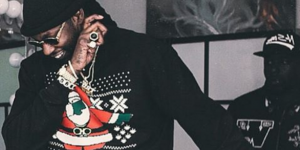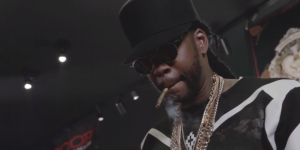TRENDSPOTTING: Crew love and the return of the hip-hop group
by Richard Trapunski
September 20, 2012
Kanye West’s G.O.O.D. Music vanity label compilation, Cruel Summer, finally came out this week after a season’s worth of delays that, ironically, pushed its release nearly into autumn. Kids are back in school, flannel is back in fashion, and, unlike mostly anything Kanye releases these days, the album has been received as an anti-climax. Kanye has perfected the art of the Event Album, but, despite the long buildup, Cruel Summer feels uncharacteristically minor. The reason: not enough Kanye.
That’s a strange sentence to type about a man whose presence is usually overwhelming, but by ceding the spotlight to an array of names big and small – Jay-Z, Common, Ghostface, Pusha T, 2 Chainz, Kid Cudi and, uh, CyHi the Prynce – Kanye makes the album feel empty every time he takes a backseat. Nearly all of Cruel Summer’s headline-grabbing highlights come from Kanye’s own envelope pushing rhymes – his reference to his girlfriend Kim Kardashian’s sex tape on “Clique” or his assertion that “Mitt Romney don’t pay no tax” on “To The World” – and not from his bold-named guest list. It’s a decidedly in-between album for the rapper, but, in typical Kanye bluster, he describes it as “a sonic snapshot of what’s happening right now, 2012.”
Ironically, he just might be right. That’s not because of the beats or rhymes – though he does get a couple of major tracks from up and coming producer, Hit-Boy – but because of the format: it’s a crew record. And what’s happening right now, 2012, is the return of the rap crew.
Take a look at the young rappers coming up from the underground into the mainstream, and nearly all of them are package deals. A$AP Rocky has the A$AP Mob, Kendrick Lamar has Black Hippy, Wiz Khalifa has his Taylor Gang, and Tyler, The Creator, Earl Sweatshirt and Frank Ocean all have Odd Future. Even bigger names have turned their loose affiliates or labels into rap groups – Drake with his OVOXO crew, for instance, or Rick Ross’s Maybach Group. In a genre that’s recently perpetuated the ideal of the lone, conquering warrior, suddenly rappers are reacquainting themselves with a willingness to share the mic.
Before you jump all over me, no, rap groups never really went away. From the early days of the Sugarhill Gang to the golden age of De La Soul, A Tribe Called Quest, NWA, Public Enemy, Wu Tang and Mobb Deep, crews have been the standard for most of hip-hop’s history. But around the late-‘90s, the terms changed. Suddenly, even on posse cuts or features, listeners wanted songs to be competitions. Rappers were described as “stealing” or “killing” tracks, and language that was once reserved for battle tracks was being applied to friendly collaborations. Teammates became opponents. Groups like D12, G Unit and the St. Lunatics remained, but they all felt like glorified entourages of their major superstars: Eminem, 50 Cent, and Nelly.
So why, in 2012, has old-school camaraderie returned to the charts? In a recent column, Pitchfork’s Andrew Nosnitsky argues that hip-hop has become too nostalgic; that young rappers like Joey Bada$$ and Spaceghostpurpp (and their crews, Pro Era and Raider Klan) are hearkening back to old, established styles and feeding it to teenage listeners without proper context or sense of history. That’s an interesting argument to make, especially as recent hip-hop criticism has rewarded the new and novel, heavily hyping whoever has most recently put out the hottest mixtape.
But rap groups in 2012 function differently from how they did in 1991. Where rappers once established themselves as part of a crew and then broke out after (like Busta Rhymes on his career defining guest spot on A Tribe Called Quest’s “Scenario,” then a member of Leaders of the New School), now they’re making their names as solo stars and then repping their crews afterwards. Major releases come from A$AP Rocky or Kendrick Lamar, but mixtapes are devoted to A$AP Mob and Black Hippy. That might be why Cruel Summer feels so disappointing – Kanye has been promoting it as an Event on the level of My Beautiful Dark Twisted Fantasy, while really it’s more of a Lords Never Worry.
In a recent interview with AUX Magazine, Kendrick Lamar outlines why rap groups fell out of fashion in the first place. “I think it got kind of corny,” he says. “That’s because it became so traditional, as far as the music goes. If there’s three people in the group, people got tired of hearing the beat, the hook, sixteen bars from first dude, hook, sixteen, hook, sixteen, hook, fade out. They got tired of hearing that same traditional format.” But Lamar describes his own group, Black Hippy, as more of a “lifestyle,” and claims a willingness to break out of the stale mould.
There’s some validity to his argument. After all, every member of Black Hippy – Lamar, Schoolboy Q, Jay Rock and Ab-Soul – could rightfully be a breakout star in his own right. But a less favourable synonym for “lifestyle” might be “brand.” In an ultra-competitive, internet-fuelled hip-hop underground, a young rapper might be more willing to break out if it seems like he’s part of a movement. And his friends are more likely to break out if one of their crew has already cleared the path.
So either hip-hop has become nicer, or rappers have become savvier businessmen.
Tags: Music, Featured, News, 2 Chainz, AUX Magazine, G.O.O.D. Music, Jay-Z, Kanye West, Kendrick Lamar, Odd Future, Pusha T





